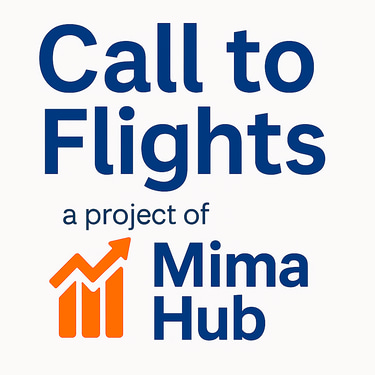The Importance of Call Duration in Airline Performance Marketing
COMPLIANCE & BEST PRACTICES – SEO PROMPTS
8/28/20257 min read


Understanding Call Duration in Airline Marketing
Call duration refers to the length of a phone call between a customer and a business representative. In the context of airline performance marketing, this metric becomes particularly significant as it directly correlates to the quality of leads generated through various marketing channels. When airlines engage in performance marketing strategies, especially through pay-per-call advertising, understanding call duration plays a pivotal role in assessing the effectiveness of their campaigns.
Short call durations may indicate that customers are not finding the information they need or that they are quickly dissatisfied with the service provided. Conversely, longer call durations can signal higher engagement levels, where potential customers have more inquiries or are moving forward in the purchasing process. Therefore, call duration serves as a valuable indicator of customer interest and satisfaction, providing insights into the effectiveness of sales interactions.
Moreover, the relationship between call duration and overall customer experience cannot be overstated. In an industry where customer loyalty and satisfaction are paramount, airlines must pay attention to how long potential clients spend on the phone. A longer conversation might suggest that the customer is genuinely exploring their options, thus leading to more informed purchasing decisions. This connection emphasizes the importance of training staff to handle calls efficiently while ensuring that all customer concerns are addressed. Performance marketers within the airline sector can leverage call duration analytics to improve both marketing strategies and customer service practices.
Ultimately, by effectively monitoring and analyzing call duration, airlines can refine their marketing approaches, enhance customer experiences, and ultimately achieve better conversion rates. This metric serves not only as a measure of success but as a vital tool in optimizing an airline’s performance marketing efforts.
Why Call Duration Matters
In the realm of performance marketing, particularly within the airline industry, call duration serves as a crucial metric that reflects customer engagement and interest. Analyzing call length can provide valuable insights into the effectiveness of marketing strategies and customer interactions. Typically, longer call durations signify that customers are more engaged and invested in the discussion, possibly indicating a higher likelihood of making a purchase. This connection is essential for airlines, as it highlights the importance of understanding customer behavior during the booking process.
Research has demonstrated a strong correlation between call length and the likelihood of completing a flight booking. When agents spend more time on calls, they can address customer concerns, provide personalized assistance, and guide potential travelers toward making informed decisions. This investment in conversation not only enhances the customer's experience but also increases the chances of conversion, ultimately driving revenue for the airline.
Furthermore, analyzing call duration helps airlines gauge customer satisfaction and interest levels. Short calls may imply that customers are not receiving adequate information or that their queries are not being adequately addressed, leading to potential dissatisfaction. Conversely, lengthy interactions can signal that customers feel heard and valued, enhancing their loyalty to the airline. Understanding this relationship allows airlines to refine their approaches, ensuring that agents are trained to engage effectively with customers without extending calls unnecessarily.
By focusing on call duration as a vital performance marketing metric, airlines can more accurately assess their customer interactions and make data-driven decisions. This emphasis on understanding call length can significantly improve both customer satisfaction and overall marketing performance.
Impact of Call Duration on Payouts
The relationship between call duration and payouts in the airline industry is critical to understanding performance marketing in pay-per-call campaigns. Airlines often structure their commission fees based on the quality and length of the calls received. In essence, longer calls are typically viewed as more valuable, as they tend to indicate higher engagement levels and lead to improved conversion rates. This correlation suggests that marketers need to pay close attention to call duration metrics to enhance their payouts effectively.
In pay-per-call models, commissions for calls can range widely based on multiple factors, including the duration of the call. Airlines often provide higher payouts for calls that exceed a predetermined length, as they are more likely to result in ticket sales or other significant conversions. Therefore, understanding this dynamic allows marketers to craft strategies that not only draw in potential customers but also extend the call length, ultimately impacting their financial returns positively.
Marketers can implement various optimization techniques to enhance their call strategies. For example, leveraging caller preferences, segmenting audiences, and offering personalized experiences during the call can lead to longer engagement times. Techniques such as targeted messaging, engaging call scripts, and effective use of promotional offers can also contribute to prolonging call durations, thereby maximizing the potential payout for each lead. Furthermore, monitoring call analytics can provide valuable insights into the average duration and success of calls, allowing marketers to refine their approaches and better align them with payout structures.
By understanding the intricacies of how call duration influences payouts, marketers can take proactive steps to optimize their campaigns. Tailoring strategies that focus on extending calls through meaningful interactions can ultimately lead to increased commissions while ensuring that quality leads are maintained throughout the process.
Compliance Benchmarks and Call Duration
In the airline industry, performance marketing is crucial for driving customer engagement and acquisition. However, it is imperative that airlines adhere to compliance benchmarks regarding call duration, which are not only set by regulatory bodies but are also influenced by the expectations of advertisers. These benchmarks serve as guidelines to ensure that communications are conducted ethically and effectively, maintaining customer satisfaction while meeting legal obligations.
The Federal Aviation Administration (FAA) and other regulatory agencies establish specific standards that airlines must follow during their marketing calls. These regulations often dictate permissible call lengths, aiming to protect consumers from excessive marketing pressure and ensure that customer interactions remain informative rather than intrusive. Advertisers, too, are increasingly focused on compliance, pushing airlines to demonstrate transparency and respect in their performance marketing initiatives. This holds true not only for call durations but also for other aspects of customer interactions.
Call duration directly impacts marketing effectiveness; therefore, airlines must balance compliance with the desire to optimize engagement. Shorter calls can sometimes lead to missing critical information that potential customers require before making a decision, while excessively long calls may frustrate recipients and detract from their overall experience. Consequently, it is essential for airlines to develop training programs that emphasize the importance of staying within recommended call lengths while still conveying pertinent information.
Moreover, compliance is not merely a legal requirement; rather, it is integral to establishing trust with consumers. When airlines adhere to benchmarks for call duration, they showcase their commitment to ethical marketing practices. This adherence ultimately leads to greater brand loyalty, customer satisfaction, and a positive reputation within the industry, thereby reinforcing the importance of compliance in performance marketing strategies.
Quality Assurance and Call Duration Monitoring
In the realm of airline performance marketing, the significance of call duration cannot be overstated. Quality assurance plays a pivotal role in monitoring this aspect, ensuring that each interaction between agents and customers meets established standards. By implementing robust quality assurance processes, airlines can enhance customer experience while effectively managing call durations. Monitoring call duration requires not only an understanding of the metrics but also the integration of tools and technologies designed to track relevant data.
One effective strategy for evaluating call quality and duration involves establishing clear performance metrics. These metrics may include average call duration, resolution rate, and customer satisfaction scores. By analyzing these correlatives, airlines can gain insights into the effectiveness of their communication strategies. Additionally, implementing call recording and analytics software allows for precise tracking of call duration, enabling the identification of patterns that may indicate inefficiencies or areas for improvement.
Furthermore, technology such as AI-driven call analytics can assist in assessing the quality of agent-customer interactions. These tools automatically evaluate calls against predetermined benchmarks, thus providing valuable feedback on both call handling times and overall performance. Such evaluations empower management to make informed decisions regarding training programs aimed at optimizing call duration and enhancing agent effectiveness.
Best practices for implementing quality assurance in this context include regular training sessions for employees focused on effective communication techniques, while incentivizing shorter, yet comprehensive, call handling strategies. Equipping agents with the necessary tools, such as decision trees or FAQs, can facilitate quicker resolutions without compromising service quality. Ultimately, a well-structured quality assurance program not only fosters improved call outcomes but also promotes a culture of continuous improvement, ensuring that both duration and overall service quality align with the airline's performance marketing objectives.
Strategies for Improving Call Duration
Improving call duration is essential for airlines aiming to enhance their performance marketing efforts. One effective approach is to invest in comprehensive training programs for call center agents. Well-trained agents are more equipped to address customer concerns proficiently, maintain meaningful conversations, and build rapport with customers. These connections often lead to longer call durations, contributing positively to the airline’s marketing objectives.
Another critical action is optimizing call scripts. Call scripts should be designed to allow flexibility in discussions while guiding agents to cover important points effectively. Adopting a conversational tone within the scripts can help in making interactions feel more personal. Regularly reviewing and updating these scripts, based on successful interactions, can help ensure that agents remain engaged with customers while delivering essential information. A flexible and engaging script ultimately influences the duration of calls by fostering a more in-depth dialogue.
Utilizing customer feedback is a potent tool in refining call strategies and approaches. Airlines can solicit feedback through post-call surveys, which can provide valuable insights into customer experiences. Analyzing this feedback allows for identifying areas of improvement and adapting the approach to meet customer expectations more effectively. Personalizing customer interactions based on past behaviors or preferences can further extend call durations as customers feel valued and understood.
Moreover, leveraging analytics can enhance marketing tactics tailored to customer needs. By analyzing call data and customer interactions, airlines can pinpoint trends and common inquiries, allowing them to tailor their marketing messages and offerings accordingly. This tailored approach not only facilitates longer conversations but also encourages customer loyalty and recurring interactions.
Conclusion and Key Takeaways
Throughout this article, we have explored the significant role that call duration plays in enhancing airline performance marketing. Analyzing call duration offers airlines valuable insights into customer engagement and service quality, which are crucial for developing effective marketing strategies. The relationship between call duration and conversion rates cannot be overstated; longer calls often indicate a more in-depth discussion, leading to higher chances of successful conversions. Therefore, understanding how to manage and optimize call durations is essential for maximizing marketing effectiveness.
One of the key takeaways from our discussion is the importance of implementing optimized call strategies. Airlines should consider training their customer service representatives to enhance their communication skills, ensuring that they can engage customers in meaningful conversations. By focusing on building rapport and addressing customer concerns efficiently, airlines may extend call durations positively influencing overall customer satisfaction and loyalty.
Maintaining compliance while optimizing call duration is another crucial element. Airlines must stay abreast of industry regulations regarding customer interactions and ensure that their strategies do not infringe on privacy norms. Adopting technology solutions to monitor and analyze call data can help airlines uphold compliance while fine-tuning their marketing efforts effectively.
Improving call quality is vital as well; therefore, airlines should invest in training and development programs that enhance the skills of their staff. Quality over quantity remains the driving principle since delivering exceptional service can lead to longer call durations that foster relationships with potential customers. Overall, effective management of call duration not only plays a role in marketing performance but also contributes significantly to enhanced customer experiences and brand loyalty. By following these paths, airlines can better position themselves in a competitive landscape.

Join
Stay updated with our latest insights.
Stay Updated
team@mimahub.com
+62 (817) 3940-82
© 2025. All rights reserved.
